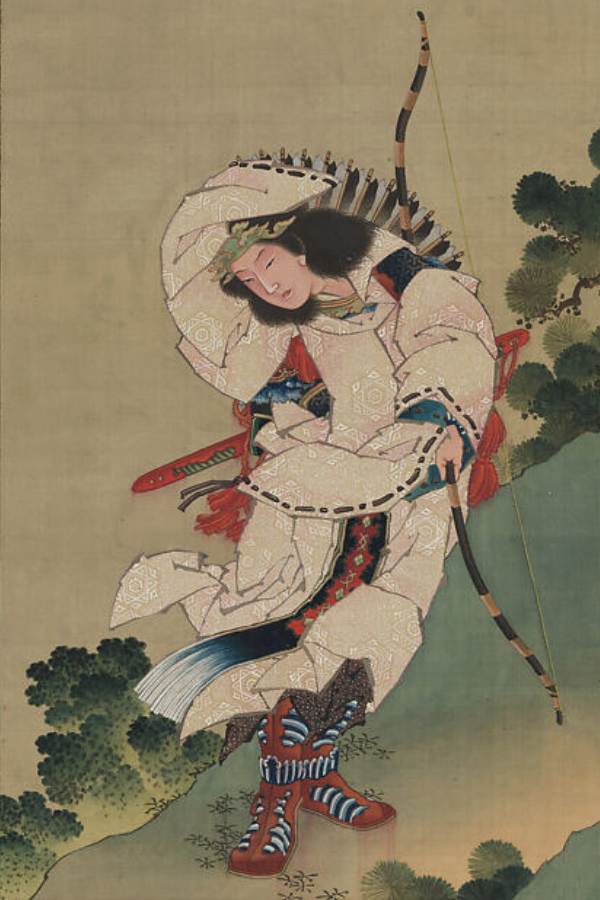

Japanese Empress Jingū: All About the Legendary Onna-Bugeisha
Summary
Empress Jingū of Japan is a legendary figure whose story blurs the lines between history and mythology. Celebrated for her supposed conquest of Korea and her status as a divine kami in the Shinto religion, Jingū’s narrative encompasses themes of leadership, divine intervention, and the empowerment of women. Despite debates over the historical accuracy of her existence and campaigns, Jingū’s legacy remains a significant part of Japanese cultural and national identity, illustrating the enduring influence of legendary figures in shaping a nation’s heritage and values. Her story, reflecting on the intersection of history and mythology, continues to inspire and resonate in contemporary Japan, offering insights into the role of mythological narratives in the construction of historical consciousness.
Reflection Questions
- How does Empress Jingū’s story challenge or reinforce your perceptions of female leadership and power in ancient societies?
- Considering Jingū’s deification and her revered status in the Shinto religion, what implications does this have for the role of women in religious and spiritual spheres in Japan?
- How does the story of Empress Jingū inspire you to think about the intersection of gender, power, and mythology in your own life?
Journal Prompt
Consider the empress as a mirror to your own society. Imagine you are a leader with the same level of influence and divine favor as Empress Jingū. Write about the changes you would implement in your society, focusing on gender equality, governance, and social welfare. Reflect on the challenges you might face and how you would overcome them, drawing parallels to Jingū’s legendary conquest and governance.
The life and legend of Jingū, Empress of Yamato Japan, is a unique combination of historical record, mythology, and lore. Legend has it that following her husband Emperor Chūai’s death, Jingū assumed the role of regent for her unborn son, Ōjin, demonstrating her significant influence and authority. According to legends, the gods later instructed her to invade Korea (a campaign whose historicity remains debated), making her a figure chosen by the heavens to lead and expand the Yamato state. The stories emphasize Jingū’s supernatural powers, her strategic genius, and the divine favor that led to the successful completion of her campaign. Let’s explore her role in Japanese history, art, and mythology below.
What Myth and Historical Records Say About Empress Jingū’s Early Origins
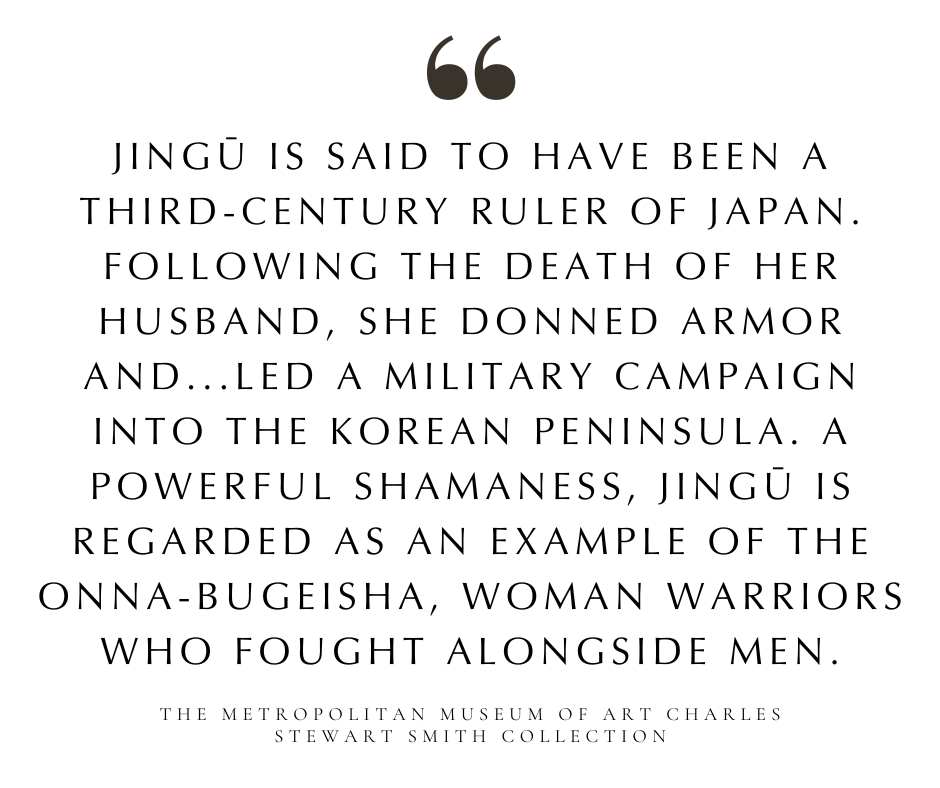

A figure depicted in Japanese art and legend, Empress Jingū’s origins are deeply intertwined with myth and the sparse historical records of early Japan, making it challenging to provide a clear and factual account of her background. The primary sources for information on Jingū, the “Nihon Shoki” (Chronicles of Japan) and the “Kojiki” (Record of Ancient Matters), were compiled in the 8th century, centuries after she would have lived, if she did indeed exist as a historical figure. These texts blend history with mythology, contributing to the complex narrative surrounding her origins.
While specific details about Jingū’s family background are not consistently documented, it is generally believed she came from a prominent or noble lineage. This assumption about her paternal imperial bloodline is based on her marriage to Emperor Chūai, as royal marriages of the time were strategic, often aimed at consolidating power and forming alliances between influential clans.
The mythological accounts of Jingū’s life often highlight her divine connections. In some stories, she is depicted as having direct guidance or communication with Shinto deities, reinforcing her perceived role as a chosen leader with a divine mandate. This divine favor is a common motif in the legends of early Japanese rulers and heroes, used to legitimize their authority and actions. By connecting her to divine guidance and noble lineage, the narratives not only enhance her legendary status but also serve to legitimize the political power and divine right of her descendants, particularly her son, Emperor Ōjin, who is also deified in the Shinto religion.
Her Marriage to Emperor Chūai
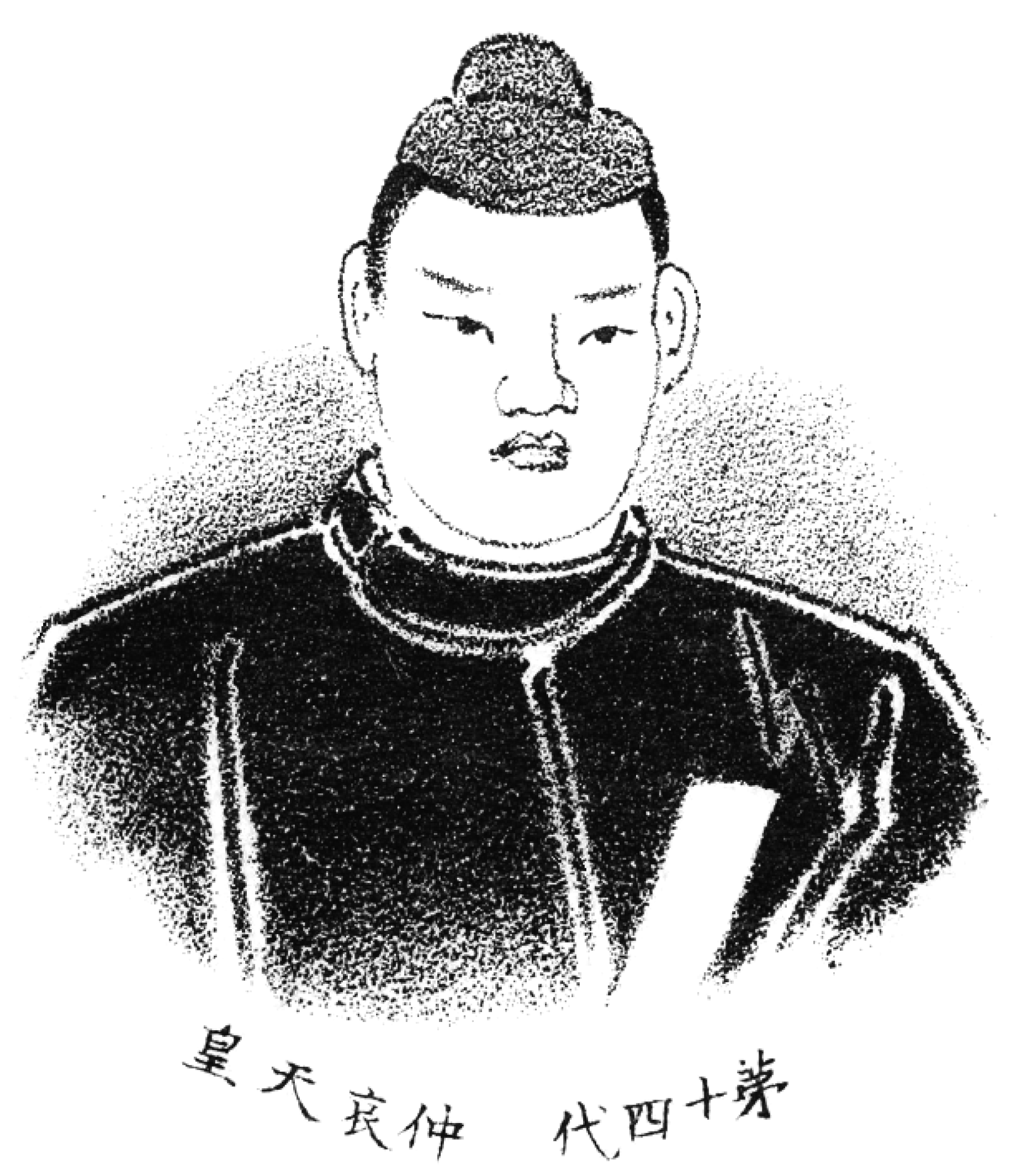

Before rising to prominence and leading military campaigns across the Korean peninsula, Empress Jingu was the consort of Emperor Chūai, the 14th emperor according to traditional Japanese order. Her marriage into the imperial family significantly influenced her status and would have played a crucial role in her ascension to power as a regent.
Empress Jingū’s marriage to Emperor Chūai is an essential part of her legend, playing a pivotal role in the historical and mythological narrative of early Japan. Emperor Chūai, traditionally recognized as the 14th emperor of Japan, ruled in the late 2nd and early 3rd centuries, according to classical Japanese texts. However, it’s important to note that the historical accuracy of these timelines and events is often debated among scholars due to the blend of mythology and history in ancient Japanese sources.
Jingū’s marriage to Emperor Chūai positioned her not only as his consort but also as a significant political and spiritual figure in the court of Yamato Japan. As empress consort, Jingū reportedly wielded considerable influence, both in the court and in religious affairs, reflecting the intertwined nature of politics and religion in ancient Japan. Her prominence in the state’s affairs grew exponentially after Emperor Chūai’s death, showcasing her strategic and leadership capabilities.
Jingu’s Ascension to Ruler of the Imperial House of Japan
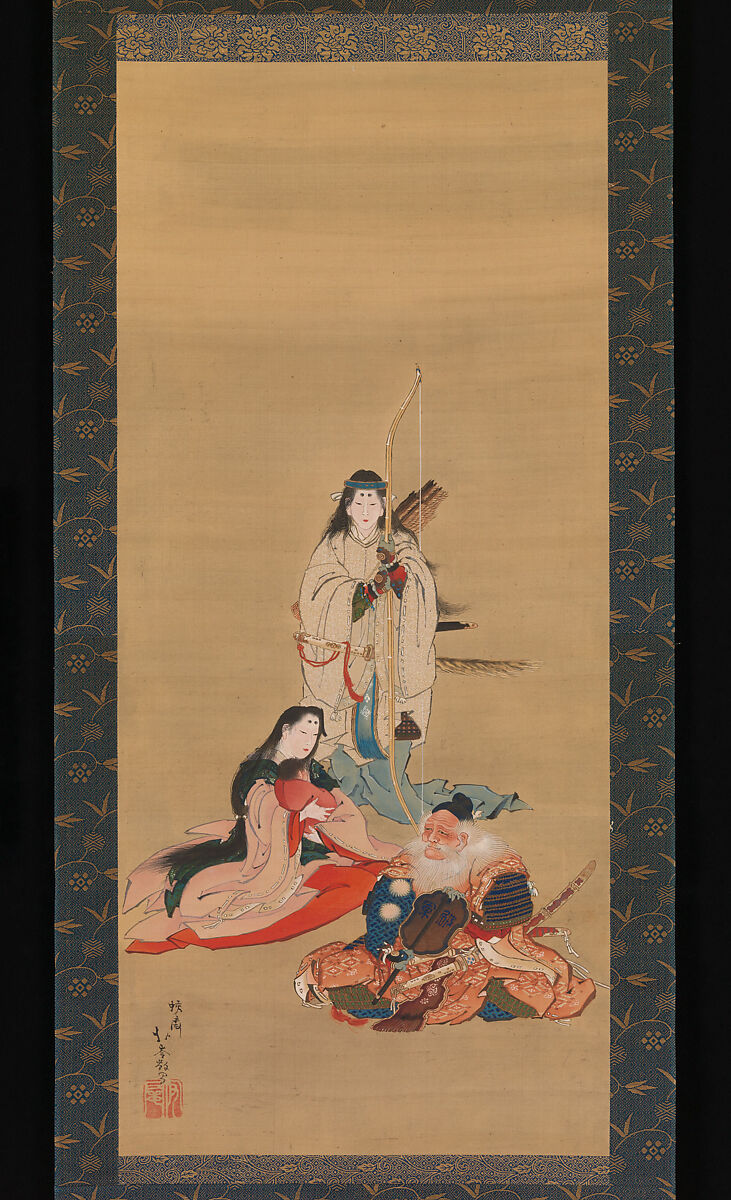

According to legend, it was during a military campaign initiated by Emperor Chūai to conquer territories in Kyushu that Jingū’s most notable contributions to history and mythology emerged. The campaign, however, faced divine opposition, leading to Chūai’s untimely death. The “Nihon Shoki” and “Kojiki” suggest that upon Chūai’s death, the legendary Empress Jingū received a divine message claiming the existence of a rich and bountiful land across the sea. Motivated by this prophecy, and with the emperor’s demise, Jingū assumed the role of regent for her unborn son, Ojin, and embarked on a legendary campaign that would cement her status in Japanese history and mythology.
Jingū’s marriage to Emperor Chūai was a turning point that leads to her legendary military campaign and subsequent deification. Her ascension as regent and her military expeditions are deeply entwined with her role as Chūai’s consort, illustrating the complex legacy of her marriage. This union not only elevated Jingū’s status but also set the stage for her mythological journey, influencing the religious and cultural landscape of Japan. Through her marriage, Jingū transitioned from a royal consort to a legendary figure, embodying themes of divine destiny, leadership, and the extraordinary prowess attributed to women in power within the annals of Japanese history and folklore.
Fuel your creative fire & be a part of a supportive community that values how you love to live.
subscribe to our newsletter
Empress Jingū’s Legendary Campaign
Empress Jingū’s legendary campaign, particularly her purported conquest of Korea, is one of the most captivating tales in the annals of Japanese mythology and history. The events leading up to this extraordinary military expedition are deeply interwoven with divine prophecy, supernatural powers, and the formidable leadership of Jingū herself. Following the death of her husband, Emperor Chūai, Jingū’s life took a dramatic turn, marking the beginning of an epic saga that would forever etch her name in the fabric of Japanese legend.
Motivated by the prophecy described above and with the sudden vacuum of power following Chūai’s death, Jingū assumed regency, effectively taking control of the state and its military forces. Her decision to embark on the campaign to conquer this promised land marked a pivotal moment in what would become her legendary narrative.
Empress Jingū’s Conquest of Korea
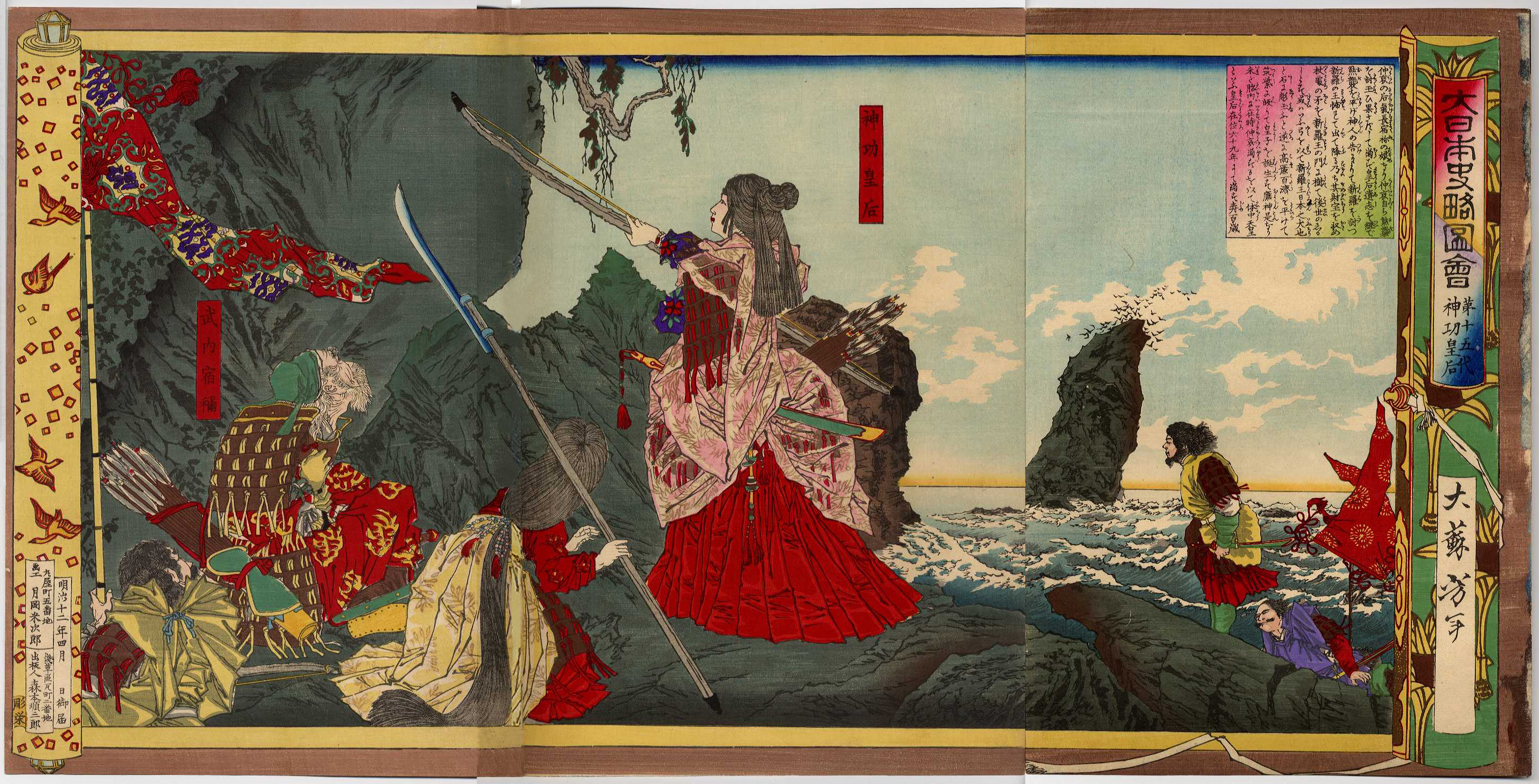

The campaign itself, often referred to as the invasion of Korea, specifically the kingdom of Silla according to some sources, is enveloped in a mixture of historical skepticism and mythological grandeur. Historical records from Korea and contemporary archaeological evidence do not support the existence of such a conquest nor of Japanese presence in Korea at this time, casting Jingū’s campaign into the realm of legend rather than historical fact. Nonetheless, the tale of her military expedition is a cornerstone of her legacy, celebrated for its demonstration of divine favor and strategic prowess.
Central to the myth of Jingū’s conquest is the claim of her supernatural abilities, particularly her power to control the tides. The legend narrates how, by divine guidance, Jingū used magical stones to manipulate the tides, securing safe passage for her troops across the sea and ensuring a surprise attack on the Korean peninsula. This miraculous event not only highlights her as a favored individual of the gods but also showcases her as a master strategist, utilizing her unique powers to make Japan victorious against seemingly insurmountable odds.
The successful return of Jingū and her forces, laden with spoils from the campaign, solidified her status as a formidable ruler and a semi-divine figure within the Japanese pantheon. Her ability to lead such a daring expedition against the Korean king, coupled with the miraculous nature of her conquest, underscored themes of divine intervention and the exceptional capabilities attributed to legendary figures in Japanese mythology.
While the historical accuracy of the conquest remains debated, the story itself plays a critical role in the mythological and cultural heritage of Japan. Jingū’s legendary abilities, especially her control over the tides, not only serve as a testament to her unique place in Japanese lore but also reflect the broader themes of human interaction with the divine and the natural world in ancient Japanese beliefs.
Empress Jingū’s Political Achievements and Governance
Empress Jingū’s political achievements and governance are enveloped in the mists of legend and historical interpretation, making it a challenge to delineate the exact nature of her contributions to the early Japanese state. However, her regency, following the mythical conquest of Korea and preceding the birth of her son, Emperor Ōjin, marks a significant period in the narratives that surround her, highlighting her role as a powerful and influential leader in ancient Japan.
Overview of Jingū’s Regency
Upon her legendary return from Korea, Jingū is said to have assumed a pivotal role in the governance of the Yamato polity, acting as regent for her unborn son, who would later be deified as Hachiman, the god of war. This period of regency is characterized by tales of her strong leadership and the divine favor that guided her actions. Though specific details of her governance are scarce and often intertwined with mythological elements, she is credited with stabilizing the state and laying the groundwork for its future expansion.
Policies and Reforms
Jingū’s policies and reforms, though not documented in detail, are believed to have been instrumental in consolidating power within the central Yamato state and expanding its influence across the Japanese archipelago. One of the most notable aspects of her rule, as attributed by legend, is the integration of the territories purportedly conquered during her Korean campaign. This not only expanded the realm but also enhanced the economic and military strength of the Yamato state.
Another significant aspect of Jingū’s governance was her effort to control and manage key resources, notably the salt and iron industries, which were critical to the state’s economy and military capabilities. By asserting control over these resources, Jingū could have bolstered the economic infrastructure of early Japan, facilitating its growth and development.
Impact on Subsequent Development of Japan
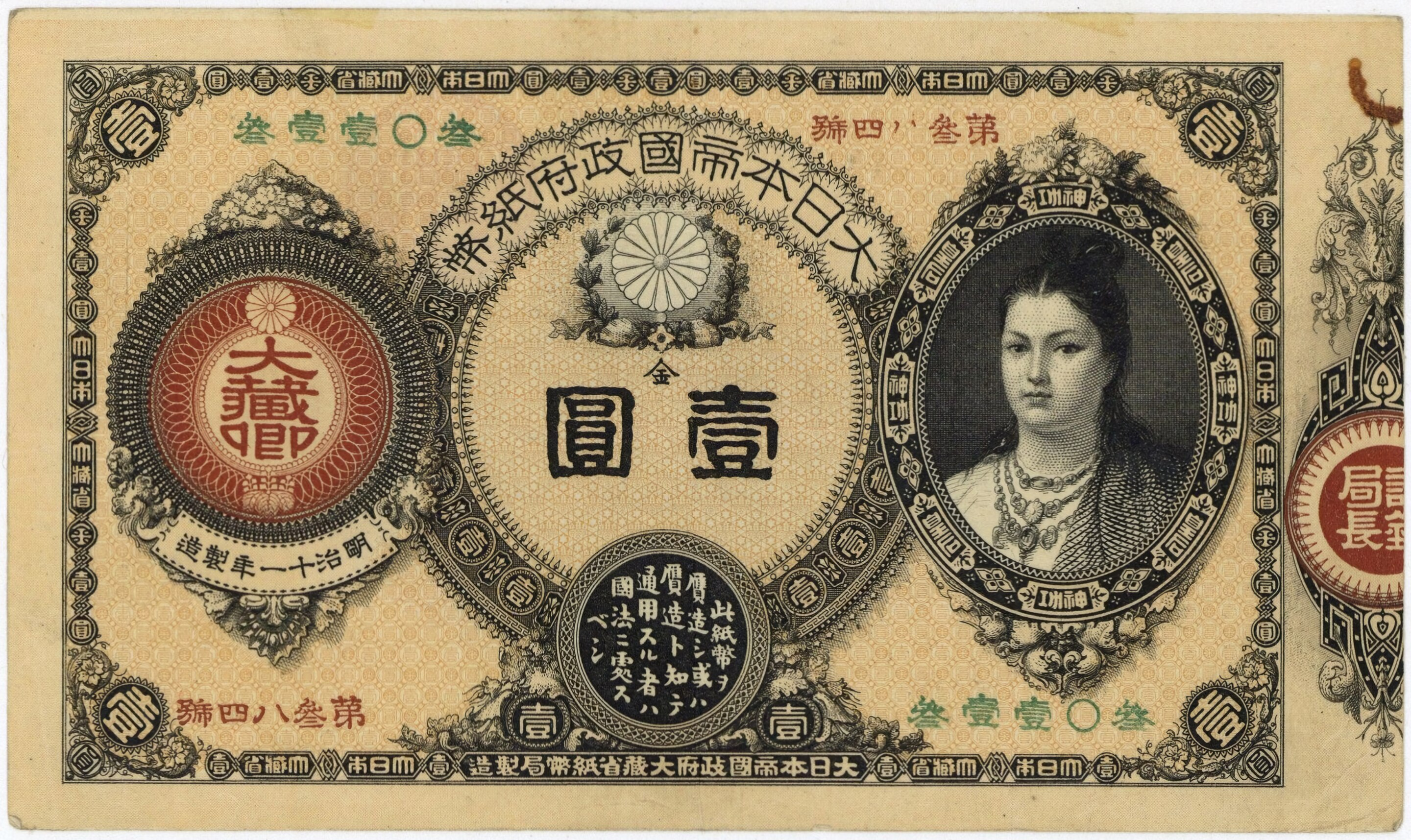

The impact of Jingū’s rule on the subsequent development of Japan is largely viewed through the lens of her legendary status and the divine legitimacy it conferred upon her lineage. Her successful regency established a precedent for female leadership in Japan’s early history, demonstrating the potential for women to hold power and govern effectively, even in a largely patriarchal society.
Furthermore, Jingū’s mythical conquest and the diplomatic relations it supposedly established set the stage for Japan’s future interactions with the Korean peninsula and the broader East Asian region. Although direct evidence of lasting reforms or institutions established by Jingū is elusive, her legend has undoubtedly influenced the cultural and historical narrative of Japan, inspiring subsequent generations and contributing to the mythological and ideological foundation of the Japanese state.
While the historical accuracy of Empress Jingū’s political achievements and governance remains a subject of debate, her legend portrays her as a visionary leader whose regency was marked by strategic consolidation of power, economic development, and the strengthening of the state. Her impact on the development of Japan, as represented in historical texts and mythological stories, underscores her importance as a foundational figure in Japanese history, embodying themes of divine favor, strong leadership, and the capability to govern and expand the early Japanese state.
Empress Jingū in Religion and Mythology
Empress Jingū’s entwinement with the realms of religion and mythology in Japan exemplifies her profound impact beyond the historical and into the spiritual and cultural fabric of the country. Her deification and status as a kami (god) within the Shinto religion underscore her transcendence from a mortal ruler to a divine figure, revered across the ages.
Deification and Status as Kami
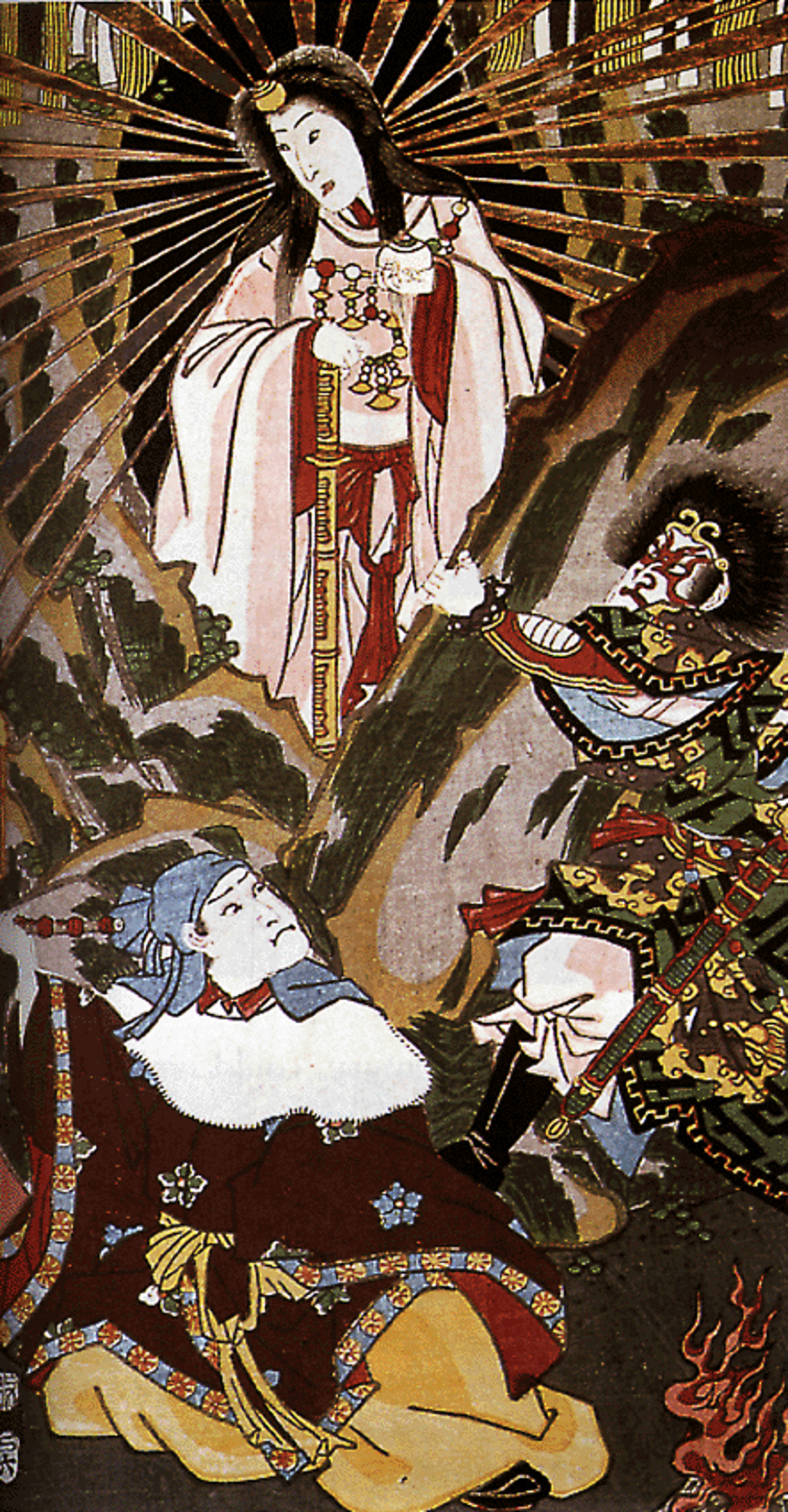

In Shinto, the indigenous spirituality of Japan, kami are revered spirits or deities that embody various aspects of life and nature. Jingū’s deification signifies her elevation to this esteemed status, reflecting her perceived divine guidance and accomplishments during her lifetime. This transformation from a historical figure (albeit one shrouded in legend) into a kami underscores her exceptional role in shaping the early narrative of the Japanese state and its people.
Jingū is venerated as a kami of leadership, maritime safety, and victory in battle, among other attributes. Her deification is closely tied to her legendary campaign against Korea and her regency, which are seen as divinely ordained achievements. As a kami, Jingū embodies the virtues of determination, strategic acumen, and divine favor, serving as a protective and guiding spirit for those who seek her blessings.
Presence in Japanese Religious Practices
Empress Jingū’s presence in Japanese religious practices is evident in the various shrines dedicated to her and the rituals performed in her honor. The most notable of these is the Gion Shrine (also known as Yasaka Shrine) in Kyoto, among others across Japan, which venerates her alongside other deities. These shrines serve as focal points for worship and rituals dedicated to Jingū, attracting devotees who seek her guidance and blessings.
Annual festivals and rituals commemorate her life and deeds, reenacting elements of her legendary campaign and celebrating her divine attributes. Through these practices, Jingū’s legacy is continually revitalized and integrated into the spiritual life of the Japanese people, ensuring her continued reverence and influence.
Role in Japanese Cultural and National Identity
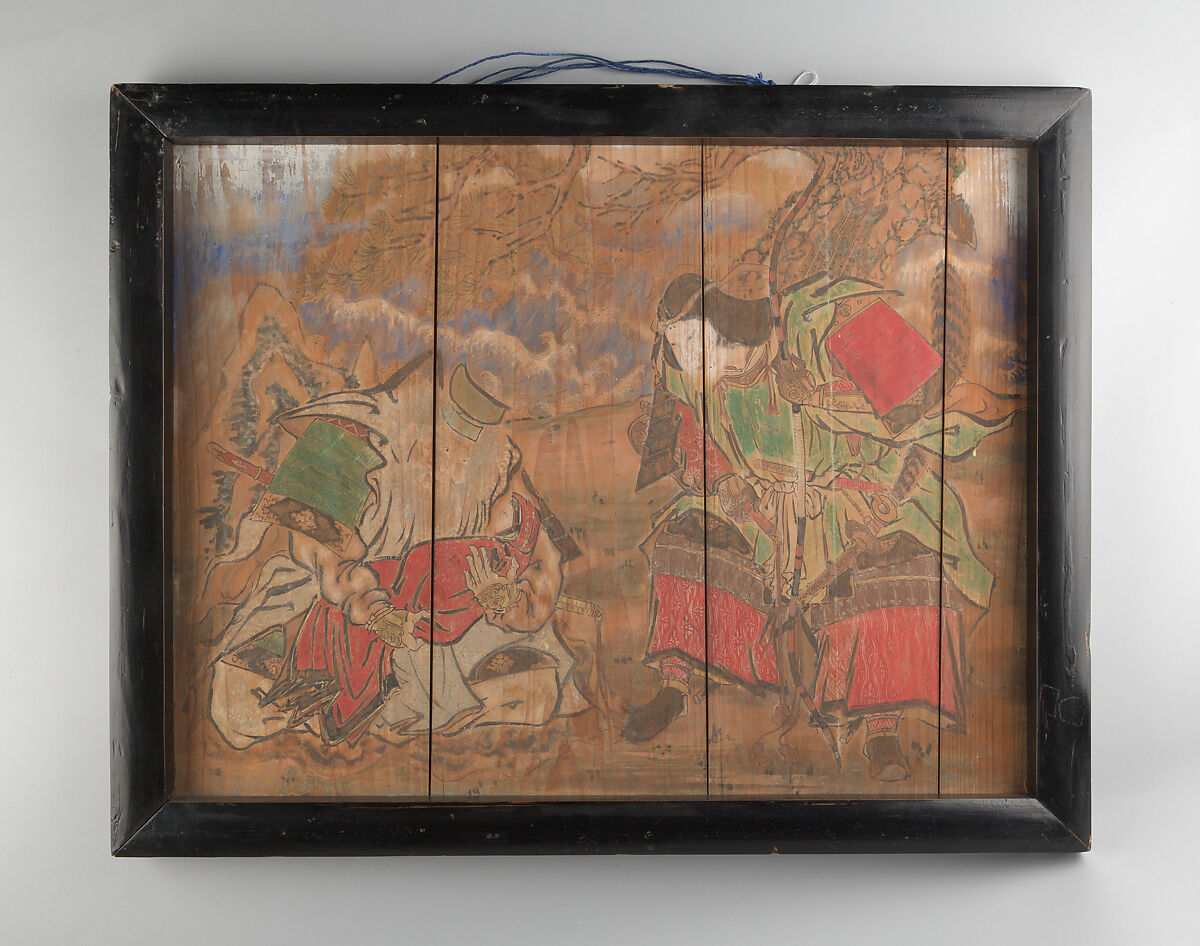

Empress Jingū’s legend plays a significant role in Japanese cultural and national identity, influencing art, literature, and folklore. Her story has been a source of inspiration for various forms of cultural expression, from Noh and Kabuki theater to contemporary media. In these narratives, Jingū is often depicted as a paragon of leadership and divine favor, embodying the virtues and values esteemed in Japanese culture.
Furthermore, Jingū’s legend serves as a foundational myth for the Japanese nation, highlighting themes of divine providence, national unity, and the legitimacy of the imperial lineage. Her deification and incorporation into the Shinto pantheon reinforce the intertwining of religion and governance in Japan, where the emperor is traditionally seen as a descendant of the gods.
The impact of Empress Jingū on Japanese cultural and national identity extends beyond mere historical interest, contributing to a collective understanding of Japan’s divine heritage and the role of its leaders in navigating the challenges of the mortal and spiritual worlds. Her enduring presence in religion, mythology, and cultural expression illustrates the profound ways in which legendary figures can shape and influence the identity of a nation and its people across centuries.
Historical Controversies and Modern Perspectives
Empress Jingū’s existence and her legendary campaign have long been subjects of debate among historians, archaeologists, and scholars, leading to a rich tapestry of historical controversies and modern perspectives that seek to understand her place in Japan’s past.
Historical Accuracy and Archaeological Evidence
The historical accuracy of Jingū’s existence and her purported campaign against Korea has been a contentious issue. The primary sources for her story, the “Nihon Shoki” and “Kojiki,” were compiled centuries after the era in which she supposedly lived, blending myth with historical events. Archaeological evidence supporting the specifics of her campaign, such as artifacts or records in Korea, has not been conclusively found, leading many scholars to question the literal truth of these accounts. Some propose that Jingū’s narrative may amalgamate stories of multiple figures or symbolically represent the expansion of Japanese influence into the Korean peninsula.
Myth, Legend, and Historical Narrative
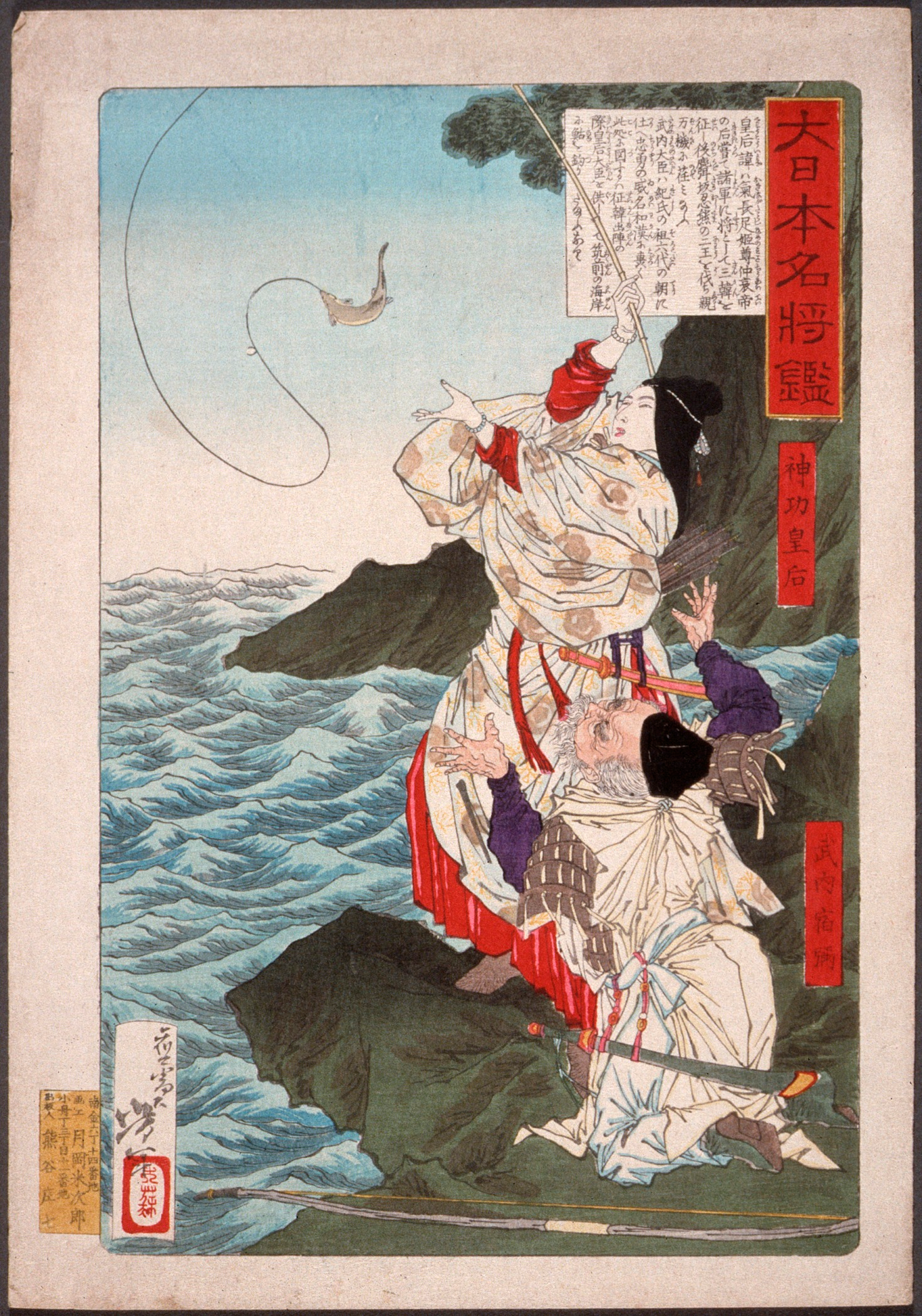

Jingū’s story illustrates the intricate role of myth and legend in shaping historical narratives. In the context of Japanese history, legends like hers serve not only as historical accounts but also as foundational myths that embody the cultural and spiritual values of the nation. These stories contribute to the national identity, providing a sense of continuity and divine purpose. Jingū’s legend, with its themes of divine guidance, exceptional leadership, and victory against odds, fits into a broader narrative tradition that links the imperial lineage to the gods, reinforcing the sacred nature of the monarchy.
Modern Interpretations of Jingū’s Legend
In modern times, interpretations of Jingū’s legend have been influenced by various perspectives, including feminist and nationalist viewpoints. From a feminist perspective, Jingū’s story is seen as a powerful example of female leadership and authority in ancient Japan, challenging traditional gender roles and highlighting the potential for women to hold power and govern effectively. Her narrative has been embraced as a symbol of empowerment and resilience, offering a historical precedent for the role of women in leadership.
Nationalist interpretations, on the other hand, have sometimes used Jingū’s legend to emphasize the divine origins of the Japanese imperial lineage and to foster a sense of national pride and unity. During different periods in Japanese history, her story has been mobilized to support nationalistic agendas, showcasing the imperial family’s long-standing divine favor and legitimacy.
Final Thoughts on the Legend of Empress Jingū
Empress Jingū’s legacy endures as both a pivotal historical figure and a legendary icon, intricately woven into the fabric of Japan’s cultural and spiritual identity. Her narrative stands at the crossroads of history and mythology, illuminating the profound ways in which legendary tales contribute to national heritage and collective memory. As a woman of extraordinary prowess and divine favor, Jingū occupies a revered place in the pantheon of Japanese historical figures, embodying themes of leadership, conquest, and the sacred lineage of the imperial family.
Her story, while surrounded by the mists of antiquity, continues to resonate in contemporary Japan, offering a source of inspiration and reflection. The ongoing relevance and reinterpretation of Jingū’s legend—through academic discourse, cultural expressions, and societal values—underscore the dynamic relationship between past and present, inviting us to consider the enduring impact of mythological figures in shaping our understanding of history and identity.
Design Dash
Join us in designing a life you love.
-
All About Our 7-Day Focus & Flex Challenge
Sign up before August 14th to join us for the Focus & Flex Challenge!
-
Unique Baby Names Inspired by Incredible Women from History
Inspired by historic queens, warriors, artists, and scientists, one of these unusual baby names might be right for your daughter!
-
Finding a New 9 to 5: How to Put Freelance Work on a Resume
From listing relevant skills to explaining your employment gap, here’s how to put freelance jobs on your resume.
-
What is Generation-Skipping, and How Might it Affect Sandwich Generation Parents?
The emotional pain and financial strain of generation skipping can be devastating for Sandwich Generation parents.
-
Four Material Libraries Dedicated to Sustainability, Preservation, and Education
From sustainable building materials (MaterialDriven) to rare pigments (Harvard), each materials library serves a specific purpose.
-
Do You Actually Need a Beauty Fridge for Your Skincare Products? (Yes and No.)
Let’s take a look at what dermatologists and formulators have to say about whether your makeup and skincare belong in a beauty fridge.








